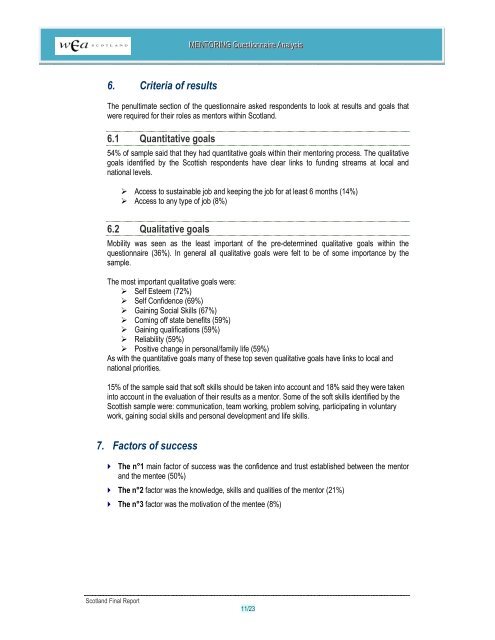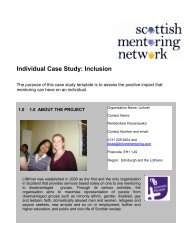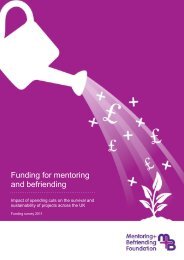MENTORING QUESTIONNAIRE EVALUATION REPORT Answers ...
MENTORING QUESTIONNAIRE EVALUATION REPORT Answers ...
MENTORING QUESTIONNAIRE EVALUATION REPORT Answers ...
Create successful ePaper yourself
Turn your PDF publications into a flip-book with our unique Google optimized e-Paper software.
MEENNTTORRI IINNG Quueesst tti iioonnnnaai iir ree AAnnaal llyyssi iiss<br />
6. Criteria of results<br />
The penultimate section of the questionnaire asked respondents to look at results and goals that<br />
were required for their roles as mentors within Scotland.<br />
6.1 Quantitative goals<br />
54% of sample said that they had quantitative goals within their mentoring process. The qualitative<br />
goals identified by the Scottish respondents have clear links to funding streams at local and<br />
national levels.<br />
Access to sustainable job and keeping the job for at least 6 months (14%)<br />
Access to any type of job (8%)<br />
6.2 Qualitative goals<br />
Mobility was seen as the least important of the pre-determined qualitative goals within the<br />
questionnaire (36%). In general all qualitative goals were felt to be of some importance by the<br />
sample.<br />
The most important qualitative goals were:<br />
Self Esteem (72%)<br />
Self Confidence (69%)<br />
Gaining Social Skills (67%)<br />
Coming off state benefits (59%)<br />
Gaining qualifications (59%)<br />
Reliability (59%)<br />
Positive change in personal/family life (59%)<br />
As with the quantitative goals many of these top seven qualitative goals have links to local and<br />
national priorities.<br />
15% of the sample said that soft skills should be taken into account and 18% said they were taken<br />
into account in the evaluation of their results as a mentor. Some of the soft skills identified by the<br />
Scottish sample were: communication, team working, problem solving, participating in voluntary<br />
work, gaining social skills and personal development and life skills.<br />
7. Factors of success<br />
The n°1 main factor of success was the confidence and trust established between the mentor<br />
and the mentee (50%)<br />
The n°2 factor was the knowledge, skills and qualities of the mentor (21%)<br />
The n°3 factor was the motivation of the mentee (8%)<br />
Scotland Final Report<br />
11/23






